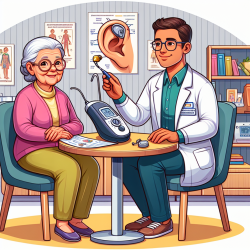Understanding the Active Transport of Peptides Across the Tympanic Membrane
In the realm of speech-language pathology and audiology, the tympanic membrane (TM) plays a crucial role in auditory health, especially in children. The research article "Active Transport of Peptides Across the Intact Human Tympanic Membrane" presents groundbreaking findings that could transform how we approach otitis media (OM) treatment, a prevalent condition affecting children's hearing and language development.
The Significance of the Study
Otitis media is a common pediatric condition that can lead to conductive hearing loss, impacting language acquisition and cognitive development. The study highlights the potential for peptide-mediated drug delivery across the intact TM, offering a non-invasive alternative to traditional treatments that often involve systemic antibiotics or surgical interventions.
Key Findings
- The study successfully demonstrated that peptides could be actively transported across the intact TM in both animal models and human samples.
- Peptide-mediated transport was observed to be effective across TMs from various species, including humans, suggesting a widespread biological mechanism.
- The research indicates that free peptides, unconnected to phage, can cross the TM, highlighting the potential for direct drug delivery to the middle ear.
Implications for Practice
For practitioners, these findings open new avenues for treating OM without the need for invasive procedures. By harnessing peptide-mediated transport, clinicians can potentially deliver therapeutic agents directly to the middle ear, reducing the reliance on systemic antibiotics and minimizing associated risks such as antibiotic resistance.
This approach could significantly improve outcomes for children, reducing the incidence of hearing loss and its subsequent impact on speech and language development. Moreover, it offers a promising solution for patients in regions with limited access to surgical interventions.
Encouraging Further Research
While the study provides compelling evidence for the feasibility of peptide-mediated drug delivery, further research is essential to refine this approach. Practitioners are encouraged to explore the following areas:
- Investigating the long-term effects of peptide-mediated drug delivery on the TM and middle ear health.
- Developing specific peptides optimized for human TM transport to enhance efficacy and safety.
- Exploring the potential for delivering a broader range of therapeutic agents, including gene therapy vectors, across the TM.
By engaging in further research, practitioners can contribute to the evolution of non-invasive treatments for OM, ultimately improving the quality of life for children affected by this condition.
To read the original research paper, please follow this link: Active Transport of Peptides Across the Intact Human Tympanic Membrane.










